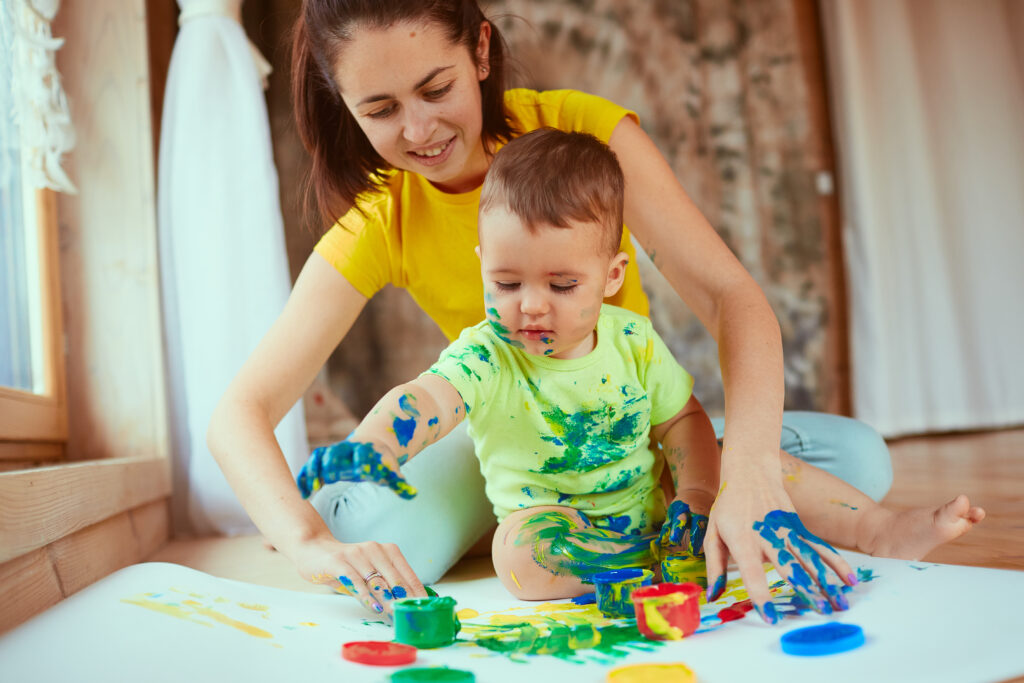Image by bristekjegor on Freepik
Your children are not your children.
Extract from a poem by Kahlil Gibran
They come through you but not from you,
And though they are with you yet they belong not to you.
You may give them your love but not your thoughts,
For they have their own thoughts.
You may strive to be like them, but seek not to make them like you.
The interpretation of what lies behind these lines can be baffling for someone, extremely annoying for some, or very confusing for others. But if this interpretation interests you, you either are a conscious parent or have the potential to become one.
What is conscious parenting? Simply put, conscious parenting is to be mindful of your actions, words, interactions, fears, attitude, and everything you do for children or around them. Conscious parenting shifts the focus back to the parents instead of children.
What is Conscious Parenting?
Parenting, especially motherhood, is one of the most demanding roles, which has the potential to bring out the best and worst in you. While our little ones are extraordinarily adorable and loving, they can bring forth emotions that we never knew existed in us. Those dreams and visions of perfect loving, calm parents can be shattered in continuous rigorous testing times of patience. If infants demand never-ending care, the toddlers are always on a mission to dismantle, decode and reengineer all that exists within your house. Let alone the challenges of teen years. This is where conscious parenting comes into play. Before we delve into how to practice conscious parenting, check out some of the lesser-known facts about it:
1. Children bring forth your issues
What if we tell you that all the upheaval involved in parenting is because you began with an incorrect goal of correcting your child.
Children are nothing but a smaller version of who you are. If you do not like that version, you need to look within yourself to bring a change in your child.
Did you know that most people turn out to be a replica of one or a combination of both parents? All families are bound by certain belief systems, religious practices, and set standards on how to behave, talk, and even think. We consciously or unconsciously pass the idea of how life should be from generation to generation. The problem? We never grow. You may hate the anger issues of your father, but there is a high chance that you imbibe the same traits at his age. We often raise children by how we are raised, with the same discomfort we once had, imbibe the same fears we had in our childhood, and pull them down with the same unfulfilled aspirations of our dreams in the past.
Sadly, along with some of your strengths, you are also giving them the worst bits of your weakness. Children are like a new sponge, eager to absorb all that happens around them, including emotions. Beginning from the womb to the early years of development, a child absorbs all emotions, trauma, fears, and insecurities of parents, especially the mother. These emotions are then translated into their personality and actions, most of which we find annoying to deal with.
This may feel like a theoretical concept in the beginning until you sit down and delve into family dynamics, and more importantly, delve into your own weakness. Take some time to analyze your biggest fears or childhood traumas, and you may be surprised to find a reflection of those in your parenting style or how your child is turning out to be. How to bring about a shift in this pattern? When you begin to manage your emotional baggage, you also transfer the healing energies back to your children.
2. Conscious Parenting is an opportunity for your spiritual growth
Conscious parenting is all about practicing mindful responses to your children. Raising a child offers a live, continuous opportunity to practice compassion, empathy, love, and letting go of your stress and anxiety to manage more important agendas like setting the right example for your child. Conscious parenting can help you learn how to remain calm in an argument, let go of the ego, appreciate the ordinary moments, let go of expectations, practice detachment, and much more.
Dealing with an infant teaches you the lesson of selfless love. A toddler can teach you an incredible lesson about living in the moment and reveling in life’s little pleasures. A school-going child encourages you to provide unconditional support in all situations.
3. Observe your intent

Check on your intent before you respond to your child. Ask some of these questions: Why am I feeling angry right now? Why does my child’s ‘No’ create a sense of disrespect within me? What should be my conscious reaction?
Most of our reactions to correct children are because we don’t want to deal with the mess created by their actions. Children’s reactions can threaten us and create a physical or emotional mess for us. Their crying at the mall makes you feel embarrassed to deal with an unhappy child, so you try your best to silence them with love or threats. If children do not behave the way you planned in front of your friends, you take the fear of being judged as a parent. How many times do you think you failed because your child attained less score? Unfortunately, our response to children has very little to do with them! Our reactions are driven by ego, prejudices, and more importantly, what we believe is right for them.
But what if your belief system is faltered? Remember that your belief system is not unbiased, these are based on your childhood traumas or faltered perspective. Are you strict with your child because your parents followed a similar parenting style? Are you overly involved in raising your child because you missed the care and attention in your childhood?
To consciously respond to your child, it is extremely important to dissociate yourself with your own past experiences. For a conscious response, evaluate the following parameters:
- Age of the child
- Understanding the real reason behind their action. Are they trying to seek your love and attention, craving some appreciation, or simply want to explore the world on their own.
- Accepting that like you, children will have their emotional highs and lows. They will go through their phases of good and bad days. All we can do is let them express and share their emotions with us.
Principles of Conscious Parenting
1. Respond consciously
Train yourself to shift from an unconscious response governed by ego or your prejudices to a more conscious one. If your child is addicted to hours of screen time, change your response from forceful shutdown of TV or ipads to offering an interesting game with you instead or create a daily routine with mutual agreement. Or in a heated argument, choose not to respond and rather have a deeper communication when the emotions have settled down. Engage your child in discussing the issues and finding mutual solutions rather than imposing your will.
It is absolutely normal for toddlers to express disagreement by crying at the top of their voices or express themselves by writing on the walls. Create a healthy dissociation between yourself and your child. Your children aren’t your projects, the trophies of success, or the symbol of failures. As challenging as it may seem to accept it, let go of your fears and ego to raise your children. What can you do in that journey? Take conscious responsibility and support them where required, and let go of their hands and encourage them to explore, learn, and grow at their pace.
2. Give them the freedom to make a choice
Creating opportunities for making a choice empowers your children to create their own belief systems. Conscious parenting is driven by making children responsible for their choices as well as the consequences of those choices. However, give them the liberty to fail. Refrain from using statements like “I knew you won’t like dance. You shouldn’t have joined dance lessons in the first place.” Let your child fall, and rise again. Remember that you want to empower them for failures and success, and more importantly, the courage to accept both.
Let go of the urge to bring perfectionism in them, or encourage them to choose a particular career or college. Do not push your concepts of religion and spirituality. We are not saying that you leave them completely and offer no support or help. It is vital to share our wisdom, give them the right information, but also provide the space to choose their path.
If giving children too many choices doesn’t fit into your parenting style, begin with some easy options. Let them decide between restricted choices, choosing between select restaurant options for the next get-together, creating daily calendars for themselves, or picking the choice between select holiday destinations etc.
3. Empower the child with gratitude, abundance, and more
Studies show that gratefulness keeps us happy, and belief in abundance can keep us away from stress and make us more successful. Yet, we find it challenging to implement it.
When you instill these powerful habits in children’s subconscious in their formative years, they are likely to live by them throughout their lives. This doesn’t mean pushing them to say ‘Thank you’ when required, but rather encouraging them to become more observant of the good things in life.
Here is a simple game I play with my 6-year-old kids at bedtime. Each one of us thinks through the day and finds one or more good things that happened. And then, we verbally thank the people, things, animals, and even ourselves for making those incidents a reality. So if they liked a dish they had that day, they would thank the dish, the person who made it, and at times even the vegetables/ fruits that were part of it. There are days when they are in no mood to think of it, or can’t recall anything extraordinary, and that is ok. But for most of our discussions, we end our days with gratitude.
Similarly, empower your child to notice the abundance in life. This doesn’t mean financial abundance, but the abundance of happiness, love, food, air, and water. Let them know and delve that life isn’t a confined experience of lack, but is governed by abundance.
Be conscious of not moving them away from difficult emotions, the reality of failure, or non-acceptance, but encouraging them to observe and appreciate small moments in life. It can be finding peace and comfort in taking a walk in the garden or spending time reading their favorite book.
4. Practice what you want to preach
Have you ever thought why shouting at children never helps? Because loud voices only translate to loud voices. What we are actually teaching them with that high volume and punishments is that these are effective ways to get your things done from others, or worse, that it is ok to shout when you are in the mood. Repeat that 10 times and you have given a shouting lesson, which will come back at you.
The best way to teach anything to children is by setting an example. If you expect them to respect you, demonstrate respect for them and others. Maintain your calm when life doesn’t go your way, for teaching them to stay patient. Remember that children imitate your behavior. If you want to bring any change in them, it has to come through you first.
5. Give them undivided attention

What is your definition of spending time with children? Feeding them and cleaning around while in the same room doesn’t help. Children are looking forward to your undivided, unchallenged attention. While we understand that taking our exclusive time for children can be challenging for both homemakers and working parents, it goes a long way in their development.
An hour of undivided attention to just listen to them, talk of their day, read a book together, or simply play a game with them works wonders in their emotional, social, and cognitive development. Irrespective of their age, your dedicated time to children is extremely valuable, and in most cases irreplaceable. In fact, it can establish a strong foundation for your relationship with children, which goes a long way in how they communicate with you, listen to your opinions, and become more compassionate beings.
The key is not quantity but qualitative time. Choose the duration that seems doable for you and try to be consistent with that routine. However, in rare situations, when you simply can’t manage that time or have to change your plans, communicate the same in advance, preferably along with reasons. Prepare to compensate for the lost time on the following day.
6. Appreciate them for who they are
How many times did you appreciate children simply for who they are? You need not look out for Grade A to be able to appreciate their effort of learning. Unfortunately, we fail to appreciate what already exists and teach the same to our kids. Take a pause to appreciate the beauty of silence, the act of doing nothing, or the feeling of just sitting next to each other with a chocolate pie. Appreciate little wonders of life and more importantly for who your children are. Share some of these with them:
“I am so proud you remained calm, even when I couldn’t.”
“You are an incredible person.”
“Your smile is magical.”
“You are a beautiful soul and I am so lucky to have you.”
Conclusion
Children aren’t your personal human project and aren’t your report card for a good or bad parent. Your children really are beyond you, with their own soul purpose and beautiful journey.
Do not load them with your ego-driven goals and past traumas. Uphold conscious parenting to empower their strength, celebrate their wisdom, and support them in seeing their own light.















